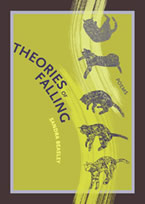
|
Sandra Beasley’s debut is bold and seductive, the kind of book you’d be drawn to even if you hadn’t seen it on the shelf wedged between Charles Baudelaire and Elizabeth Bishop. The second word of “Cherry Tomatoes” sets the tone, as the opening poem describes the luscious and metaphorically-loaded qualities of a badmouthed fruit: “Little bastards of vine,” Beasley writes, “Little demons by the pint.” Wry lines like these, no doubt, led Marie Howe, judge for the 2007 New Issues Prize, to mention how she, “kept coming back to these poems,” that, “the tough lyric voice…got under [her] skin.” Split into three sections, Theories of Falling explores the spontaneity of human relationships and the shifting mythologies of family history. However, what makes it a truly remarkable collection is how Beasley undercuts the gravity of each theme with a fresh sense of metaphor, and how she challenges a poem’s limitations. Theories of Falling has not only given us a new voice to pay attention to, but it thrusts Sandra Beasley to the forefront of an increasing number of young, influential contemporary American poets. “My Los Alamos,” one of the book’s finest poems, showcases Beasley’s range of tone and poetic invention. Reading the poem gives you the sense that you’ve finally been given the answer key to those dreadful fill-in-the-blank ACT questions where you’re asked: “If ‘patience’ is to ‘traffic jam,’ then _________is to ‘a snow storm in northern Australia at 6:00 in the morning.’” Or, something like that. Only this time, the questions seem practical and worthwhile, even if you don’t know what you’re being asked: “My soybeans for your silo,” the poem begins, “My pitcher for the infielder.” It sounds simple enough. However, once you think you’ve got the syllogisms figured out, Beasley alters the trajectory of the poem into something mysterious, a quixotic turn that outlines both the possibilities and the shortcomings of logic: Make no mistake: This isn’t a poem of place, although hints of New Mexico are sprinkled throughout the poem like small towns on a map of the Midwest. It’s an attempt to reconcile the present with the past, but in a heartfelt way that refuses the sentimental status quo: “My hand for your forgiveness,” the final stanza reads, “My hand for your forgetting.” That sounds nice, you start to think, which is perhaps why those words stand corrected by the next and final two lines: “My first date for your Dairy Queen, / My thinking a fist could forget.” Often, Beasley contemplates the inevitable juxtapositions that only human relationships can offer. Poets have long been concerned with such matters, even before they had need to write down the lines or knew what constituted a Horatian Ode. But, once you consider the cataloging of “American Thing,” a kind of twenty-first-century-opposite’s-attract, you understand that Beasley’s hardly uncorked a bottle of business-as-usual: “You believe the methadone will help you. / I believe a three course meal can be // microwaved. This room holds my bed and / my kitchen. This is our nineteenth date.” The tone is comic and desperate, and necessarily so. The straightforward narrative—how the speaker plays the roles of both lover and nurse to an addict going through withdrawal—belies the poem’s actual subject matter. It’s what happens behind closed doors that holds Beasley’s eye, the things we ignore as we proceed about our routine lives: When we finally sit up as if the pus were some exotic sauce. holding clean, untouched. Before the city There’s no hint of proselytizing. Behind closed doors, after all, a moral compass rarely reads the same as it does when it sees the light of day. The poem’s quiet conclusion is rife with suggestion: “Who knows what happenings in our own lives go beyond the notice of others? More importantly, who knows what we’re not noticing ourselves?” Matters more close to the heart and home also highlight this collection. “Cherry Tomatoes” sets the tone. When the speaker, disgusted as a child by these “[r]ed eggs that never hatch,” finally bites into one as a grown adult now far away from her rural upbringing, the taste surprises her: of a perfect household. Once upon a time, cherry tomatoes symbolized the frustrations between parent and child. One bite, though, and all is changed. The fruit now represents an inescapable bond, one layered with flavors textured and tasteful, bitter and bold. Beasley also uses the mythology of ancient civilizations and American pop culture in order to build tension within a poem that attempts to break down the mythology of her character’s family history. “The Green Flash” outlines the idiosyncrasies of its speaker to establish a critical element of her character: I read about Orpheus and stood in front of the mirror, glancing over my should just to see Eurydice drop away. resist? I liked a trick, but what I loved was the reveal. It’s hard to predict what comes next. When the speaker’s mother finds a developed roll of film (missing three photographs) in the father’s desk, she casually flips through the family pictures. The daughter, however, wants to know what’s on the other three. So, she takes the negatives to the window and “holds [her] father up that ruthless sun and look[s], and look[s].” If she finds anything scandalous or implicating , however, we’re not told. The poem ends with that line and stops short of its own reveal. The trick’s being played on you, of course, but by then you don’t care: You’ve already been mesmerized by Beasley’s use of language and metaphor, her keen wit and playfulness. All you want is to see is how she pulls it off in other poems. --Jay Robinson
|
